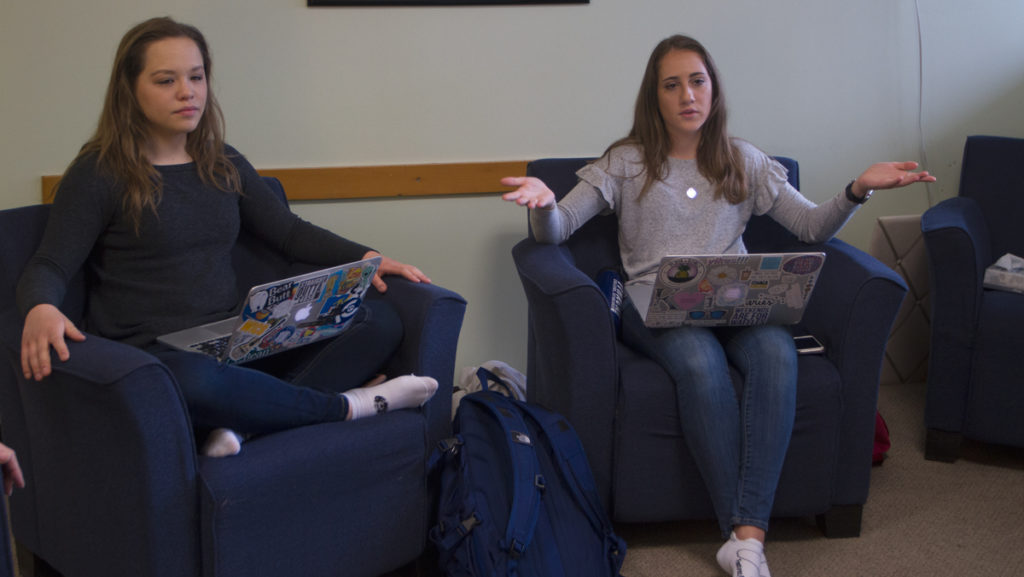Ithaca College will launch an Ambassador Program sponsored by the Center for Counseling and Psychological Services and the CAPS Committee in order to help incoming freshmen make a successful transition to college.
The program, which will officially launch in Fall 2018, allows rising sophomores, juniors and seniors to apply to become ambassadors. After undergoing training by CAPS staff members, they will be prepared to help connect students with resources to promote mental health and overall wellness, including how to manage stress. Ambassadors will each be given a set number of students to oversee over the course of the year. The Ambassador Program is accepting applications until April 25.
Sophomores Kristin Butler and Sarah Horbacewicz, Student Governance Council Class of 2020 senator, developed the program. Horbacewicz initiated the creation of the CAPS Committee through an SGC bill. Horbacewicz started the committee and the program after reaching out to Deborah Harper, director for the Center for Counseling, Health and Wellness, last year about the negative experiences she had with CAPS, such as difficulty booking appointments. Butler said one of the inspirations for the program came from a similar ambassador program that was instituted at her high school to help incoming freshmen transition to high school life.
Horbacewicz said she began working with Harper to create a forum for students, student organizations and faculty members to have a dialogue with CAPS to find areas for growth and develop strategies to improve its services. She said the committee began looking at ways to connect students with all the resources on campus. Harper said the committee has been meeting every other week during this academic year.
During the pilot program, each student in the school with the most ambassador applicants will be assigned to an ambassador. In other schools, there will be general ambassadors that students can reach out to, but they will not be formally assigned. Butler said the plan is to eventually have the program be campus-wide.
“We understand that this is the first year so it’s kind of more of a pilot,” Horbacewicz said. “We’re not going to get a million ambassadors this year but hopefully in the future it’ll gain traction.”
Horbacewicz said that at the beginning of May there will be an informal mini training session to welcome the accepted applicants to the program. She also said the soft launch of the program will start with a destress fest, a day of relaxing events such as crafts and games, May 7 to introduce people to the ambassadors and CAPS staff.
Harper said that the exact training that students will go through in the fall is still being developed by staff members. She said the training will revolve around the idea of how to take care of oneself while supporting others in a healthy manner.
The program is searching for faculty ambassadors so that students know there are designated faculty members they can go to if they need help connecting with other on-campus resources, Horbacewicz said.
Butler said there will be a publication that CAPS will develop to hand out to each faculty member that will compile all of the mental health and wellness resources on campus, as well as the contact information for the ambassador within the faculty member’s school.
“If a student comes into their office and they say, ‘I’m going through this — I don’t know what to do,’ it’s not just ‘Go to CAPS.’ It can be, ‘Here are some resources, why don’t you go to your ambassador, why don’t you come talk to me?’” Butler said.
Horbacewicz said she thinks the ambassador program will help incoming freshmen face the challenges that come with being away from home for what is usually the first time. She said she thinks the ambassadors can answer questions that will help freshmen navigate being a part of the college community.
“You go into college basically not knowing anyone, you’re in this new place, and for a lot of people, it’s your first time really away from home,” she said. “If you step in, and from orientation, or from fall welcome, have that designated Ithaca ambassador friend and upperclassmen friend when you come in, it just adds so much because you don’t have to be nervous about going to someone.”
Harper said CAPS is currently re-working its service model to offer more resources than just therapy. Harper said not everyone’s mental health needs require counseling and that CAPS is working to accommodate different levels of need. She said that beyond clinical services, the college needs more community-based services — something that she thinks the student ambassadors can aid in connecting students with. She said there will be a focus on skill development, such as the Anxiety Toolbox workshops CAPS currently offers.
“I think for students, whether they’re first-year students or senior students, really respond well to peers,” Harper said.
Freshman Claire Bailey said her first three weeks of transitioning into college were difficult but that she eventually adjusted. She said she thinks the Ambassador Program will be a good resource for incoming freshman to support them and answer their questions outside of the individual counseling that CAPS provides.
“You just need an in-between, someone to talk to who you feel comfortable with and you know wants to be there for you, like they signed up for this as well,” she said.
Bailey said she is also considering applying to be an ambassador.
“I would definitely even apply to be an ambassador myself,” she said. “I would love to be that person for a freshman because I know that I wish that I had that person.”








